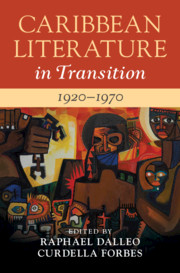Book contents
- Caribbean Literature in Transition, 1920–1970
- Caribbean Literature in Transition
- Caribbean Literature in Transition, 1920–1970
- Copyright page
- Contents
- Figure
- Contributors
- Introduction
- Part I Literary and Generic Transitions
- Part II Cultural and Political Transitions
- Chapter 7 Debating Language
- Chapter 8 Periodical Culture
- Chapter 9 Decolonizing Education
- Chapter 10 Imaginaries of Citizenship and State
- Chapter 11 Postcolonial Stirrings
- Part III The Caribbean Region in Transition
- Part IV Critical Transitions
- Bibliography
- Index
Chapter 8 - Periodical Culture
from Part II - Cultural and Political Transitions
Published online by Cambridge University Press: 16 December 2020
- Caribbean Literature in Transition, 1920–1970
- Caribbean Literature in Transition
- Caribbean Literature in Transition, 1920–1970
- Copyright page
- Contents
- Figure
- Contributors
- Introduction
- Part I Literary and Generic Transitions
- Part II Cultural and Political Transitions
- Chapter 7 Debating Language
- Chapter 8 Periodical Culture
- Chapter 9 Decolonizing Education
- Chapter 10 Imaginaries of Citizenship and State
- Chapter 11 Postcolonial Stirrings
- Part III The Caribbean Region in Transition
- Part IV Critical Transitions
- Bibliography
- Index
Summary
Periodicals played a significant role in the development of the region’s nationalist literature and politics. The Jamaican newspaper Public Opinion in 1938 helped launch the People’s National Party. Edna Manley, the editor of Focus, was part of Jamaica’s key political families. The magazines Bim in Barbados and Kyk-over-al in Guyana supported the growth of a West Indian literary tradition in the decades leading to independence. Yet the periodical culture of the region was more diverse and contradictory than a focus on these key periodicals demonstrates. Considering a wider body of magazines such as the Caribbean Post and West Indian Review in Jamaica; the Barbadian Forum and the Outlook; or the literary magazine Trinidad and its contemporary The Caribbee, among others, shows the range of periodical projects circulating in the early decades of the twentieth century. These magazines were a key forum through which the West Indian middle classes negotiated the process of cultural decolonization. As well as building cultural and political literacy, the magazines through their pages, competitions, and reviews produced and printed a literary culture both by, and for, Caribbean readers and writers – one which is importantly distinct from the later market-driven publishers working to promote Caribbean literature from the metropole.
Keywords
- Type
- Chapter
- Information
- Caribbean Literature in Transition, 1920–1970 , pp. 131 - 144Publisher: Cambridge University PressPrint publication year: 2021

